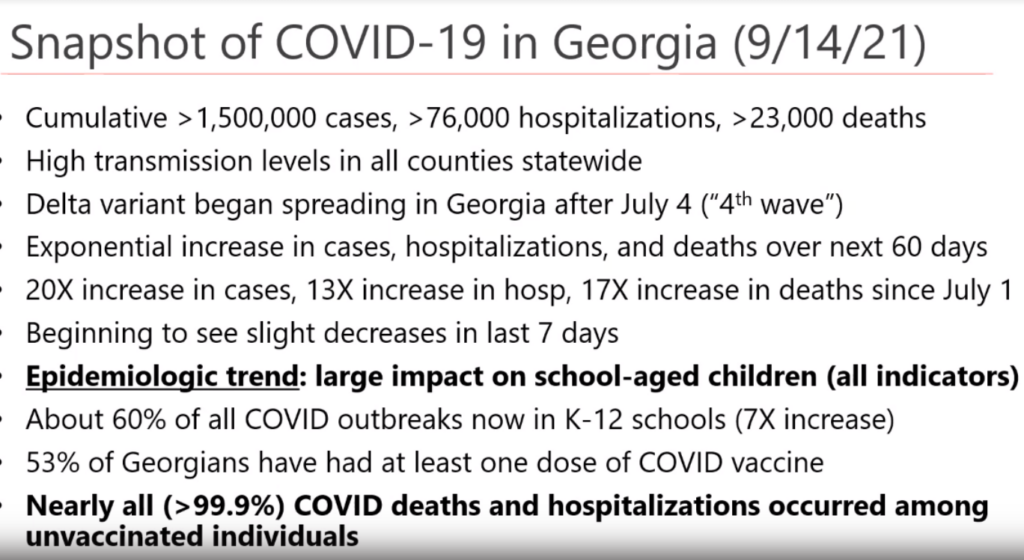
Almost 60% of all new COVID-19 outbreaks are now in Georgia’s K-12 schools, the state’s top epidemiologist said Tuesday.
Cherie Drenzek, state epidemiologist for the Georgia Department of Public Health, said the highly contagious delta variant is responsible for the surge.
“The delta variant began spreading in Georgia around July 4,” Drenzek told a virtual meeting of the state’s Board of Public Health. “There has been an exponential increase in cases, hospitalizations and deaths over the last 60 days.”

According to Monday’s COVID totals provided by the state Department of Public Health, more than 1.1 million Georgians have contracted coronavirus since the pandemic began in March 2020. A total of 20,705 Georgians have died, and there have been more than 76,000 hospitalizations.
According to data provided by Drenzek to the board, there has been a 20-fold increase in cases; a 13-fold increase in hospitalizations; and a 17-fold increase in COVID deaths since July 1.

However, both Gov. Brian Kemp’s office and Drenzek said state data has begun to show slight decreases over the last seven days.
Dr. R. Chris Rustin, director of the department’s Division of Health Protection, said as of Tuesday, more than 10 million vaccine doses have been administered in Georgia, with 4.7 million Georgians, or 45% of the state’s population, being fully vaccinated. About 5.4 million of the state’s residents, or 53%, have received at least one vaccine dose.

Rustin also said Georgia is offering 136 sites for monoclonal antibody treatments, commonly known as Regeneron infusion.
Rustin said preliminary data shows monoclonal antibody therapy is effective mostly early in treatment.
“You have to get it early on,” Rustin said, who added the state Department of Public Health is collaborating with the Department of Community Health to support the existing sites across the state.

“It’s important to stress this is not a substitute for vaccines,” Rustin said.
The treatment, according to the Southeast Georgia Health System, helps the immune system stop COVID-19 from spreading in people with mild to moderate symptoms. The antibodies are synthetic proteins that are manufactured in a lab.
The therapy, according to the health system, isn’t new; doctors have long used this treatment to deliver drugs or radioactive substances directly to cancer cells.
The U.S. Food and Drug Administration (FDA) has given monoclonal antibody therapy emergency use authorization for the treatment of COVID-19.
According to the FDA, clinical trials showed that COVID-19 patients who received antibody infusions had a significant reduction in hospitalizations and deaths compared to patients who received a placebo.
Florida is one state that has launched a statewide initiative that offers the treatment at 21 sites. While Georgia offers the treatment at far more sites than its Sunshine State neighbor, it seemingly has no plans to sponsor a statewide program.
When asked by Capitol Beat if Gov. Brian Kemp has any plans for such an initiative, the governor’s office referred to Kemp’s Aug. 24, 2021, authorization of 105 Georgia National Guard personnel to 10 hospitals around the state.
“This Georgia National Guard mission is in addition to the 2,800 state-supported staff and 450 new beds brought online, at a total state investment of $625 million through December of this year,” Kemp said.
This story is available through a news partnership with Capitol Beat News Service, a project of the Georgia Press Educational Foundation.